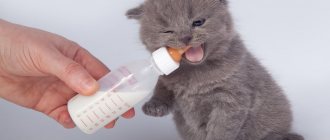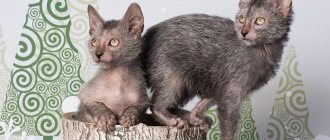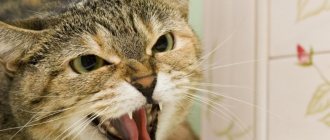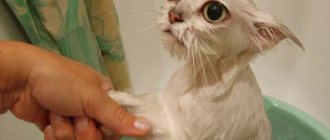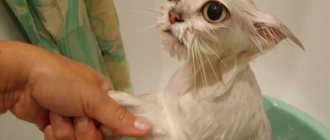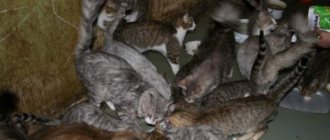Where does the idea that cats are afraid of cucumbers come from?
In the summer of 2015, with the help of a video posted on the website of one of the popular publications, a cat’s fear of green vegetables was clearly demonstrated to the world for the first time. And although such an experiment is hardly humane, many people began to repeat the same trick with their four-legged pets. In this case, people see the reaction of cats as extremely funny and do not think about the reason for such fear, about what the cat himself is experiencing at this time.
Video: cats' reaction to cucumbers
The joke about a cat's reaction to a cucumber is that when the animal eats, it doesn't feel threatened. He is surrounded by familiar objects, delicious food, and a master whom he loves. The cat does not expect a trick and experiences real panic when suddenly a long green object appears from behind him from nowhere. The cat panics.
Seeing a cucumber near him while eating, the cat jumps out of fear and surprise
You're annoying your cat
Your cat may not be afraid of bananas at all. Instead, your pet may become frightened by a strange object that happens to be near it, especially if you placed it nearby while it was sleeping. Can you imagine how scared you would be if you woke up in your bed with a huge watermelon lying next to your head? Now imagine if this watermelon stank to high heaven! You would probably also try to run away as quickly as possible.
Perhaps the problem is not the banana at all. Your cat may run away from it because of the way you act when you present it to her. If you shove a banana in your cat's face or chase it around the house with a yellow fruit at arm's length, your pet is most likely afraid of you, not the banana.
Causes of fear
Veterinarians, cat breeders and other “cat” experts have identified several reasons why a cat experiences fear when an ordinary cucumber appears in its field of vision.
Cucumber is a new item for the cat
Cats are usually suspicious in order to be able to quickly protect themselves in case of danger. This is the main reason for their fear of cucumber. The animal's violent reaction to this object suggests that cats do not like the effect of surprise.
They are used to being in control of everything that happens around them. The problem of a cat's fear, in essence, does not lie in the cucumber itself; it is broader in scale, since the animal is afraid not so much of this vegetable as of all other unknown objects that suddenly appear on its territory.
The cat is frightened by new objects and is wary of them.
Some curious cat owners decided to check how their pets react to other oblong objects. The animals were given curling irons, zucchini, and bananas. If they appeared in the cat’s field of vision suddenly, like a cucumber, then the result was the same: the animal was afraid of them.
The cat considers the cucumber a threat
The fear associated with the appearance of a cucumber is not a phobia, it is an adequate reaction of the body (an existing instinct) in response to sudden external stimuli, a possible threat or danger.
This reaction of the animal is called the start reflex, during which the cat jumps away, and from there it evaluates the current situation and the likelihood of a threat. A simple cucumber may look like a snake or other natural threat to an animal.
The cat considers the cucumber a threat
While eating, the animal's vigilance is weakened
The place where the cat eats is considered the safest by him. While eating, the cat's entire attention is absorbed in food, his vigilance is weakened. He doesn't wait for a threat. Therefore, a cat’s protective reflex can react to both a cucumber and any other object that appears unexpectedly.
Another possible reason is the cat’s psychological trauma. It is possible that the cucumber was previously used to intimidate the animal, which is why now it is so afraid of it.
Shy nature of the animal
Fear of cucumbers can arise due to the nature of the animal itself. He has increased nervousness, heightened sensitivity to everything that happens, and an unbalanced character. In this case, the pet will be frightened by the sudden appearance of a cucumber and other factors.
The fear of cucumber is associated with the timid nature of the cat.
Cats may associate cucumbers with snakes
Another reason why cats may be afraid of cucumbers is that they may associate them with snakes, which are deadly predators that can attack.
According to Jill Goldman, a certified animal behaviorist in southern California, cucumbers can appear like snakes to cats because of their green, elongated surface.
The way a cat jumps in the air out of sheer fright may seem funny and cause laughter, but it is not actually funny, at least not for the pet that is subjected to the experience. Regardless of the reason, it's not fun to scare your pets. And this is potentially very bad for them.
“You shouldn’t just stress your pets out,” Goldman told National Geographic. "If you're doing it for laughs, it makes me question your humanity."
Russian cats are not afraid of cucumbers: truth or myth
Among the cat owners there were those who could not resist and subjected their pets to the cucumber test . The results of such experiments showed that not all cats are afraid of cucumbers. There are also animals that are not only indifferent to these vegetables, but also show interest in them, play with them, drag them around the apartment from corner to corner.
The findings suggest that the videos that caused a stir on the Internet may have just been successful pranks. And since the majority of cat owners who confirmed that their pets had no fear of cucumbers were residents of Russia, another interesting statement arose that Russian cats are not afraid of such a vegetable as a cucumber.
Undoubtedly, this opinion would flatter animals from Russia, but it is wrong. In fact, among the Russian representatives of the cat family there are those who experience a fear of cucumbers as strongly as their foreign counterparts. The attitude towards a cucumber is caused by the temperament of the four-legged friend, and not by his nationality or place of residence.
Since the cause of fear is hidden in the animal’s subconscious instinct, this means that any cat can be afraid of a cucumber, regardless of breed and other conditions. And if a Russian, American, or English cat was not afraid of this vegetable, and even became interested in it, then this does not indicate the uniqueness of the animal. Everything explains the cat’s character, expressed by his actions, obedience, and emotions.
Some cats are aggressive towards surprises, others want to study an unknown subject, and still others will even decide to just eat a green vegetable. In fact, the assumption that Russian cats are not afraid of cucumbers is a myth.
Some cats are quite tolerant of cucumbers, play with them and even taste them.
Myth: Banana peels are poisonous to cats.
It is commonly said that banana peels are toxic to cats and that is why they are afraid of them. However, this is completely false. Banana peels may be very bitter and unpleasant to chew, but they will not kill your cat.
Cats can eat bananas, but they are not very good for their health. While the potassium and complex carbohydrates make this tropical fruit healthy for humans, the high sugar content can cause obesity and diabetes in cats. Cats are big meat eaters and require only minimal micronutrients from vegetation to keep them healthy.
Should you test your cat for a fear of cucumbers?
Experts do not recommend finding out if your pet has a cucumber phobia. We should not forget about the possible consequences, among which are:
- Physical injury to the animal. It happens at a time when a cat, frightened by a vegetable, can jump, crash into some piece of furniture in the apartment and get hurt in the process.
- Growing feeling of anxiety. If you often repeat the experiment with a cucumber, the cat ceases to feel safe, and its anxiety intensifies. The cat may not come into your arms and hide.
- Psychological trauma arising from the stress experienced. The appearance of a cucumber as a source of increased anxiety and nervousness can lead to more serious problems, prompting the cat to even run away from home.
- Increased aggressiveness. An animal can bite and scratch not only the object of its irritation, but also its owner.
- The habit of dragging food out of the bowl in order to find a more protected place in case of a second “attack” by the vegetable.
- Disobedience, which can be expressed in different ways: a change in behavior, repeated urination in the wrong place.
An owner who loves his cat should not subject him to such tests, knowing how it could end.
And yet, my Russian cat Syoma, picked up a year ago on the street, was subjected to a similar test with a cucumber. For some reason I was confident in my pet. She took the cucumber out of the refrigerator and brought it to her nose. He sniffed it indifferently and that was it. He didn’t get scared, didn’t jump, much less run away. Brave cat! And apparently calm. And I didn’t eat the cucumber.
Consequences of fun
Experiments on animals, even those that seem quite innocent, have never been supported by society. Veterinarians are calling for an end to the abuse of cats. After all, behind each of these videos there are certain consequences.
Injuries
Sudden movements often result in bruises. A frightened animal, obeying the instinct of self-preservation, strives to quickly leave the dangerous place. They crash into tables and chairs, knock over cups and pots. As a result, the cat may receive injuries that can dramatically worsen their standard of living.
Moral shock
Still, fear is not only funny and fun, but also a hidden threat to health. And, if the animal has had a negative experience near the bowl, then for a long time he will be afraid to come up to eat. Lack of water and food will definitely affect your well-being. Constantly being stressed will clearly not improve your pet's health.
Digestive tract problems may even arise and excretory processes may be disrupted. As a result, the owner should expect weakened immunity, insomnia and disorientation of the pet. If the cat was also bullied in order to accustom it to the “correct” reaction to a cucumber, then you can forget about friendliness and trust.
Only two conclusions can be drawn from everything:
- Cats do not have any phobia about cucumbers and bananas. An animal can become frightened by the presence of any unknown object in its home environment. With the same success, you can place a book or phone next to the bowl - the reaction will be identical;
- For the sake of a funny video, a person causes irreparable damage to the health of a pet, and often loses the trust of the pet. Is it worth the bonuses for good views? Everyone finds their own answer to this question.
Is it possible to fight fear?
To avoid harm to the cat's mental health, the pet owner should try in a calm environment to help his pet overcome his fear of cucumbers. To do this, you don’t need to suddenly take them out. You need to put the cat on your lap, pet him, show him this green vegetable. You should calmly talk to the animal, let it smell the cucumber, play with it, bite it, taste it.
In a calm environment, a cucumber will not cause a feeling of fear in a cat.
When the cat becomes familiar with this vegetable, he will no longer be afraid of it and will not experience stress from its unexpected appearance. On the contrary, such familiarity with the subject has a positive effect on the animal’s psyche. It is important not to force the cat to perform any actions when introducing it to a cucumber. If he is afraid and does not want to approach the vegetable, you just need to leave it on the floor. Perhaps, over time, the cat itself will become interested in the object that initially caused its fear, and will want to get to know it.
If your pet continues to be afraid of a cucumber, you should limit its ability to see this vegetable.
Psychological characteristics of the animal
A cat’s fear of cucumbers can also be explained by the peculiarities of its psychology. Of course, animals, like people, can be in different emotional states. The reaction of an animal, which in itself is very restless and anxious, and sometimes it is not even clear for what reasons it shows aggression, will be revealed in the form of such panic fear.
And another reasonable explanation is that when the pet was constantly intimidated with a cucumber or even beaten with it, then the cat, of course, will tremble at the sight of such a vegetable.
We recommend viewing
Why do cats change their sleeping places? Why do cats act strange when you scratch the base of their tail? How to keep cats away from bird feeders
Cats are not usually afraid of bananas; These fruits are harmless and non-toxic to cats. Most likely, the smell of bananas causes cats to run away. Because their sense of smell is so effective, the ether that bananas produce can cause anxiety in a cat.
If your pet is terribly afraid of bananas, then you should not use this fear as some kind of trick for entertainment. Your cat may become increasingly traumatized and hostile and end up taking her anger out on you—or her fruit bowl.
What other vegetables and fruits can scare a furry pet?
Most curious owners wanted to know what else would scare the animal as much as a cucumber. During such experiments, the owners found that cats are afraid of all long vegetables and fruits: eggplants, bananas and zucchini.
Can dogs really have melon: fact or fiction?
Note! It is not the cucumber and other vegetables themselves that causes a feeling of anxiety in the animal, but their sudden appearance nearby.
What will such experiments lead to?
The wave of video recordings does not stop, interest outweighs love for the animal and encourages people to carry out further experiments. Veterinarians and zoologists urge us to stop testing and injuring our pets.
Any fear turns into a nervous shock; continuous experiments have a bad effect on the well-being, appearance and actions of the animal:
- the pet is afraid to approach the bowl of food. He may stop eating and won’t even touch his favorite sour cream, which means weight loss and dehydration are inevitable;
- stomach diseases begin;
- the process of food digestion is disrupted;
- the fur begins to fall out in clumps;
- the animal may suffer from problems with the urinary system;
- the immune system deteriorates;
- the feeling of anxiety increases, causing the pet to experience shock;
- sleep becomes restless and sensitive.
Note! After several similar experiences, the pet stops trusting its owner. In place of a calm, sweet and kind cat comes an angry, indifferent, closed-off cat. The owners are unhappy with this condition and, of course, take the cat to the veterinarian. However, it is very difficult to return to its previous state; the dissatisfied animal begins to lose consciousness, after which it suffers a heart attack.

